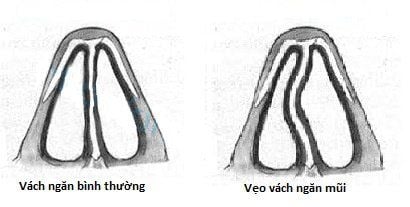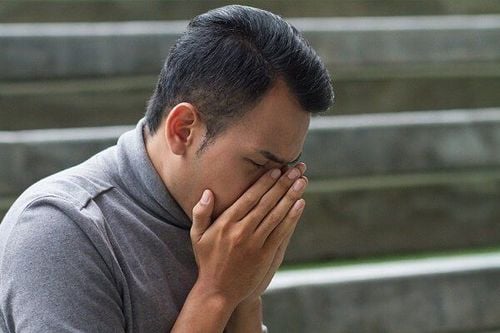This is an automatically translated article.
The article was professionally consulted by Specialist Doctor of Otolaryngology - Department of Medical Examination and Internal Medicine - Vinmec Hai Phong International Hospital.
The disease of the nasal septum is often caused by congenital or strong impact, causing the nasal septum to deviate, not only affecting aesthetics but also sometimes causing many dangerous complications. The treatment for deviated septum is medication and surgery to correct the septum.
1. What are the effects of deviated nasal septum?
Deviated nasal septum (or deviated nasal septum) is usually congenital, begins to appear when children are 6 years old, can also be seen in children from 2 to 3 years old, more common in people with high nose bridge. .
Deformed nasal septum causes patients to have frequent nasal congestion and is at risk of causing sinusitis, sinus infection, which is very dangerous. This condition needs to be treated early to avoid unwanted long-term effects on the patient's health.

2. Diagnosis of deviated nasal septum
To determine the severity of a deviated septum, your doctor will start with an overview of your symptoms. The doctor then examines the inside of the patient's nose with a lamp or speculum, which is designed to widen and see inside the nasal cavity. Alternatively, the doctor may administer a spray to reduce the level of congestion in the nose before looking at the tissues inside the nose.
In most cases the doctor only needs to do a physical examination, no other special tests are needed. In addition, the doctor will check the patient's sleep, the possibility of snoring, sinus problems, and breathing difficulties. If a deviated septum is causing nosebleeds, recurrent sinusitis or some other serious problem, the patient should be treated with an ENT specialist or a plastic surgeon. .
3. How to treat a crooked nasal septum?
3.1. Medications Before proceeding with complex treatments for deviated septum, the doctor will prescribe the necessary medications and means to control and stabilize the symptoms. This helps to treat nasal congestion and drainage.
Medications used to treat a deviated septum are decongestants, antihistamines, and steroid nasal sprays:
Decongestants work to reduce swelling in the nasal tissue and help keep the airways open. more open. However, patients need to adhere to treatment, take medication in a controlled manner and at the right dose because regular use of the drug can make the patient dependent and worsen symptoms after stopping use. . Antihistamines help limit allergy symptoms, including blocked and runny noses. However, some antihistamines have the side effect of causing drowsiness and affecting your ability to concentrate while driving. Steroid nasal sprays work to reduce inflammation in the nasal passages, helping to reduce congestion and drainage in the nose. Nasal flaps are also used to manage symptoms of a deviated septum.

3.2. Septal correction surgery If after a period of taking medicine, the symptoms still do not improve, the doctor may suggest performing rhinoplasty surgery, correcting the nasal septum for the patient. Surgery is performed with the aim of correcting a deviated septum. Before surgery, you will be asked to stop taking certain medications, such as aspirin or ibuprofen, for two weeks before and after surgery. Patients also need to quit smoking because the harmful effects of tobacco can interfere with the healing process. The entire surgical procedure usually takes about 90 minutes and is performed after the patient is anesthetized. During surgery, the doctor will correct the nasal septum, cut the septum, remove excess cartilage or bone that causes the septum deviation. Once the excess cartilage is removed, the septum and nasal passages will be straightened. In addition, a silicone splint can be inserted to support the septum after surgery.
Currently at Vinmec International General Hospital, the problem of deviated nasal septum is solved by the method of endoscopic orthopedic nasal septum surgery. Surgery is indicated for all patients with deformed septum causing obstruction of nasal ventilation, obstructing nasal sinus drainage, deviated septum causing irritation to headache, and obstructing the passage of nasal passages. endoscopic sinus surgery and abnormal cases causing sinusitis.
Please dial HOTLINE for more information or register for an appointment HERE. Download MyVinmec app to make appointments faster and to manage your bookings easily.













